Contents
Market Overview
Macro Update
Markets were momentarily jolted this week by renewed political pressure on Federal Reserve Chair Jerome Powell. President Donald Trump publicly questioned whether Mr. Powell should remain in his role, intensifying his campaign to influence monetary policy amid dissatisfaction with the pace of rate cuts. The threat of Mr. Powell’s dismissal – though ultimately walked back – triggered a sharp and immediate market response. Within 30 minutes, the Treasury yield curve steepened, with the 2-year yield falling 10bps, reflecting expectations of policy easing, while the 30-year yield rose 10bps, the S&P 500 fell nearly 1%, and the Bloomberg Dollar Index dropped 1.2%.
Such a move would be unprecedented and legal constraints remain significant. Under the Federal Reserve Act, a president can only remove a Fed chair “for cause,” a standard that would likely face scrutiny in court. The administration may attempt to test this threshold by pointing to a congressional investigation on significant cost overruns tied to the renovation of the Federal Reserve’s Washington headquarters, currently estimated at over $2.5 billion.
Despite the political noise, underlying macro signals remain relatively contained. June headline CPI came in modestly above expectations (2.7% year-over-year vs. 2.6%), while core inflation stayed stable (2.9% year-over-year; 0.2% month-over-month vs. 0.3%). Retail sales surprised to the upside, and jobless claims fell to 221,000 – highlighting continued labor market strength. Importers have begun passing through tariff-related costs to consumers, raising the prospect of renewed inflationary pressures, though the scale and persistence of that passthrough remain uncertain. The University of Michigan’s preliminary July sentiment survey rose marginally to 61.8, from 60.7 in June, marking a second monthly improvement, after plunging in April and May.
Markets ended the week firmer. U.S. equities recovered losses to finish higher. Yields on 10- and 30-year Treasuries closed near 4.40% and 5.00%, respectively, little changed on the week. The USD attempted to rebound but finished the week around 98 on the DXY, back where it started. Key commodities posted modest gains, with oil prices mostly stable around $70/barrel (Brent). Gold spot was also in a holding pattern, at around $3350/oz.
On the trade front, the U.S. reached a revised agreement with Indonesia, lowering tariffs to 19% in exchange for purchases of U.S. energy, agriculture, and aircraft. President Trump also committed to new military aid for Ukraine via NATO, including Patriot air defense systems. Fresh sanctions on Russia remain under consideration but are linked to a proposed 50-day peace deadline, which we view as an unrealistic timeline.
In Europe, German Chancellor Friedrich Merz and UK Prime Minister Keir Starmer signed a comprehensive bilateral pact, highlighting growing momentum behind European economic and security self-reliance. Eurozone data pointed to modest improvement: Final June CPI was in line at 2.3%, industrial production rebounded, and German investor sentiment (ZEW) exceeded expectations. UK data remained underwhelming, with unemployment rising to 4.7% and CPI surprising slightly to the upside.
In Asia, China’s Q2 GDP rose 5.2% year-over-year, above expectations, aided by infrastructure spending and consumer subsidies. But consumption signals were mixed: June retail sales missed forecasts, at 4.8% vs. 5.3%, while industrial production beat expectations, at 6.8% vs. 5.6%.
Elsewhere, G20 finance ministers met in South Africa to address global trade tensions and sluggish growth. U.S. Treasury Secretary Scott Bessent was notably absent. In the Middle East, Israel conducted targeted strikes on Damascus in response to Syrian aggression toward Druze fighters – a reminder of the region’s persistent fragility.
EM Credit Update
Emerging market hard currency sovereign debt edged lower this week, posting a 0.31% decline. Investment-grade debt fared marginally better than its high-yield counterpart, returning -0.26% versus -0.36%, even as U.S. Treasury yields moved wider. At the index level, sovereign spreads widened by 3bps, with investment-grade barely budging (+1bp) and high-yield seeing a more pronounced widening of 7bps.
Regional dynamics played a key role in this week’s divergence. Latin America came under pressure, particularly Argentina, Mexico, and Ecuador, as investors recalibrated risk appetite following weeks of robust demand. Lebanon emerged as the week’s notable underperformer, weighed down by profit-taking. Meanwhile, Ukraine remained on a downward path, reflecting the compounding risks from ongoing geopolitical tensions and heightened Russian military activity. By contrast, the Middle East delivered relative stability, ending the week flat and standing out as the strongest regional performer.
In local currency debt, EM sovereigns slipped by 0.26% amid a modestly firmer U.S. dollar. Nonetheless, the segment continues to shine on a year-to-date basis, with cumulative gains of 12.1%. This underscores investor confidence in select local markets and monetary frameworks that are combined with technical diversification away from the U.S. dollar.
EM corporate debt provided a modest offset, finishing in positive territory with a 0.06% return at the index level. High-yield slightly outpaced investment-grade (0.10% vs. 0.02%), supported by resilient credit spreads that remained largely unchanged over the period.
The primary market moderated in pace but stayed constructive, with 11 deals pricing. Notably, Indonesia returned to the market following the announcement of the trade agreement with the U.S.
The Week Ahead
U.S. Treasury Secretary Bessent will visit Japan for the 2025 World Expo in Osaka, where he is expected to meet with Japanese officials to discuss tariffs. This could have significant implications for the trade relationship between the two countries. In the eurozone, the European Central Bank (ECB) is expected to keep rates on hold following eight consecutive cuts as it awaits more clarity on tariffs. The ECB will also release its survey of professional forecasters, providing insights into expected rates of inflation, real GDP growth, and unemployment in the region. Eurozone consumer confidence will also be reported and several EM countries are making policy rate decisions this week: Hungary, Nigeria, Sri Lanka, and Türkiye.
In the U. S., Chair Powell will give remarks at a Tuesday conference on bank regulatory capital. Existing home sales data will be released, along with new home sales, initial jobless claims, and the S&P Global Manufacturing PMI – all providing further clues on the state of the U.S. economy. Corporate earnings are also in focus, with Alphabet, Tesla, IBM and others set to report, which will offer insights on the performance of major tech companies and their outlooks. President Trump is planning to outline his artificial intelligence priorities at an event titled “Winning the AI Race” before going to Scotland on a private trip where he is expected to meet with UK Prime Minister Starmer.
Other notable economic events include the EU-China summit in Beijing, where European Commission President Ursula von der Leyen and European Council President Antonio Costa will meet with President Xi Jinping and Premier Li Qiang.
Additionally, several others will release their manufacturing PMI data next week, including the eurozone, UK, France, Germany, India, Japan, and South Korea. Thailand is poised to name its new Central Bank Chief, whose term would start October 1st.
Fixed Income
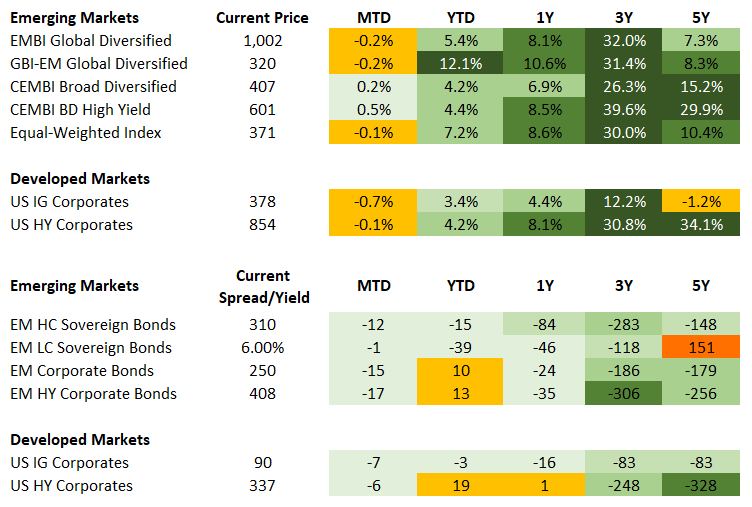
Equities
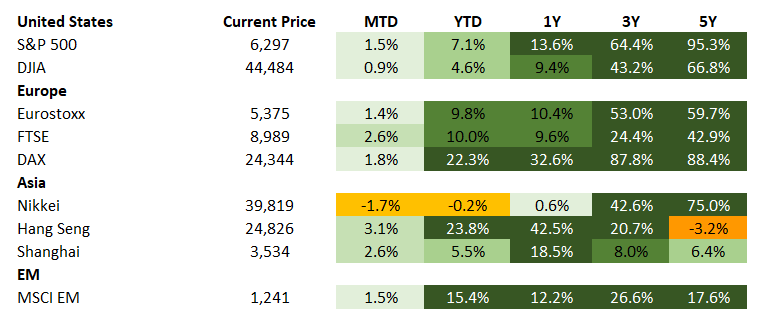
Commodities

Source for data tables: Bloomberg, JPMorgan, Gramercy. EM Fixed Income is represented by the following JPMorgan Indicies: EMBI Global, GBI-EM Global Diversified, CEMBI Broad Diversified and CEMBI Broad High Yield. DM Fixed Income is represented by the JPMorgan JULI Total Return Index and Domestic High Yield Index. Fixed Income, Equity and Commodity data is as of July 18, 2025 (mid-day).
Highlights
Imamoglu’s Jail Sentence Has Limited Market Relevance for Türkiye
Event: Türkiye’s most prominent opposition figure and Istanbul Mayor Ekrem Imamoglu was handed a twenty-month prison sentence for “threatening Istanbul’s chief prosecutor.”
Gramercy Comment: This sentence was expected and has been incorporated in valuations, as confirmed by the muted market reaction to a major political development. Pending a lengthy appeals process, the sentence could disqualify Mr. Imamoglu from running in the next presidential election, set for 2028. This might be a significant political victory for President Recep Tayyip Erdogan, who is interested in running again, despite the constitutional challenges. Mr. Imamoglu is seen locally as the opposition figure with the highest chance of defeating Mr. Erdogan in a face-to-face electoral contest. He has been jailed since March when the news of his arrest caused a brief sharp risk-off episode for Turkish assets. That has been largely reversed – but cost the country tens of billions in foreign exchange reserves to defend the Turkish lira.
Although political risks remain significant, the failure of Mr. Imamoglu’ s legal troubles to produce any meaningful social turmoil has reassured markets that fears about Türkiye’s political stability are overstated, as we have argued. Key signposts that we will keep monitoring in the coming months are potential stronger pressure on other prominent opposition figures, such as Ankara mayor Mansur Yavas, as well as the ongoing legal proceedings against the leadership transition in the main opposition party, CHP. The less politically threatened President Erdogan feels from opposition forces, the more likely he is to remain supportive of Türkiye’s market-friendly macroeconomic adjustment, which has been the key constructive market driver for Turkish assets in the last couple of years.
Senegal’s Plans to Rebase GDP Overshadow Ratings Downgrade
Event: Authorities in Senegal announced that a process to rebase the country’s nominal GDP data, which could result in a higher output figure, remains underway. This came on the heels of a ratings downgrade by S&P, from B to B- with a negative outlook, that was driven by the country’s more constrained fiscal position amid higher debt, deficit, and financing needs. Senegal’s eurobonds ended the week higher.
Gramercy Comment: A more accurate calculation of Senegal’s economic size following several years of robust growth would likely provide relief to headline fiscal ratios, and – paired with ample fiscal consolidation and normalized relations with the IMF – would materially lower spreads. A meaningful positive catalyst would be the long-awaited IMF waiver related to the previous government’s misreporting under its paused IMF program. We expect this to pave the way for negotiations over a new IMF program and an updated debt sustainability analysis. The government has conveyed commitment to significant fiscal consolidation to avoid a debt restructuring, although further material delays in normalization with the Fund or social pressures would pose downside risks.
Dominican Republic Appoints New, Technocratic Finance Minister
Event: Following Jose Manuel Vicente’s resignation from the Minister of Finance position in the Dominican Republic, the President appointed an experienced technocrat, Magin Diaz, to the post. Mr. Diaz has held various positions within the ministry, including Deputy Minister of Fiscal Policy and Public Credit in the second Medina Administration, has consulted for the World Bank and the Inter-American Development Bank, and has provided material contributions to the country’s prior fiscal reforms. On the economic front, remittance growth in 1H25 remained resilient at 11% year-over-year, while tourism growth rebounded moderately after softness in 1Q.
Gramercy Comment: We see Mr. Diaz as a constructive choice for minister and expect policy continuity, with prospects for the enhanced tax policy and reform momentum that ran into headwinds last year. Continuation of macroeconomic resilience in the context of U.S. growth and policy uncertainty, including a new U.S. 1% remittance tax, combined with further progress on fiscal reform, could catalyze 1-notch upgrades from Moody’s and Fitch’s. The agencies have had the country’s ratings of Ba3 and BB- on positive outlook since 2H23.
Emerging Markets Technicals
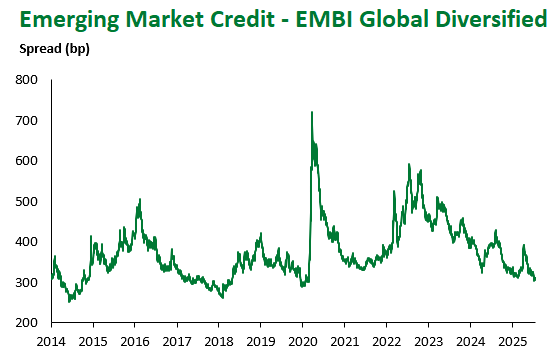
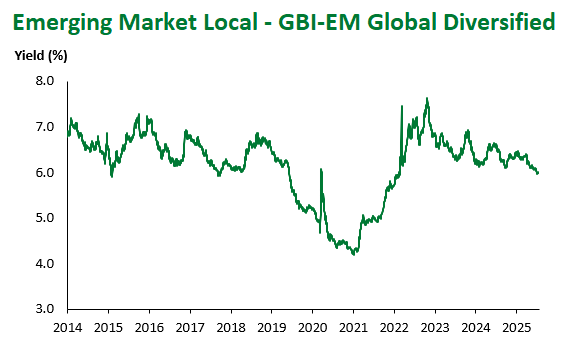
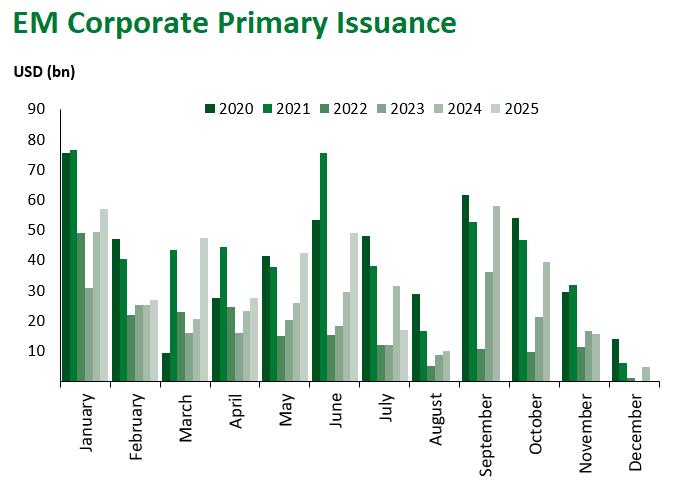
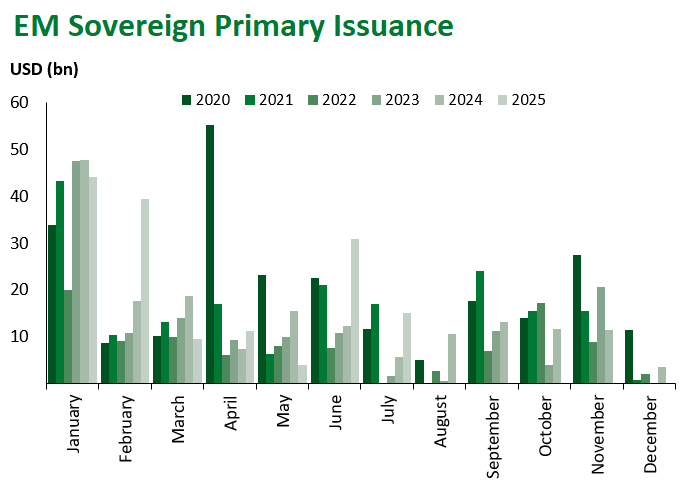
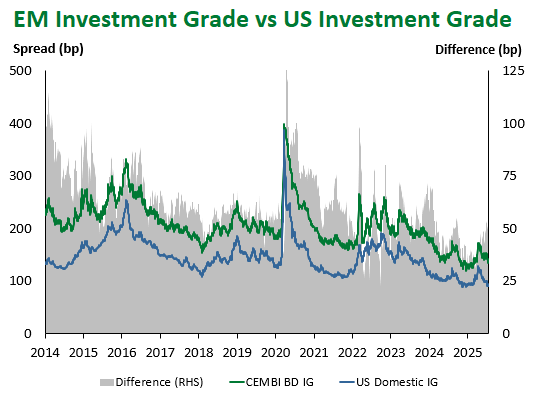
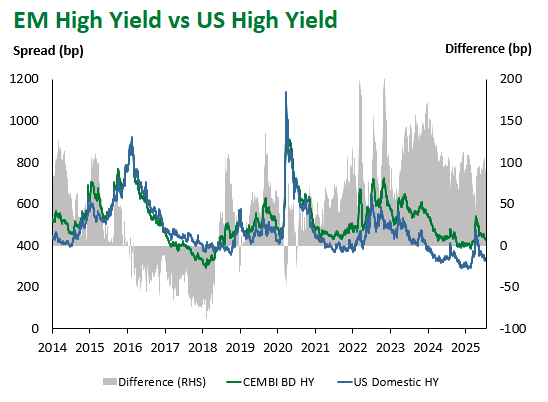
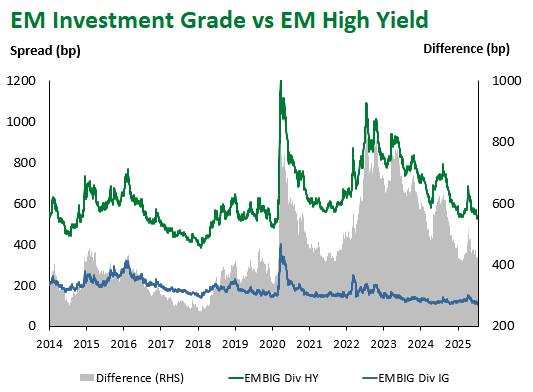
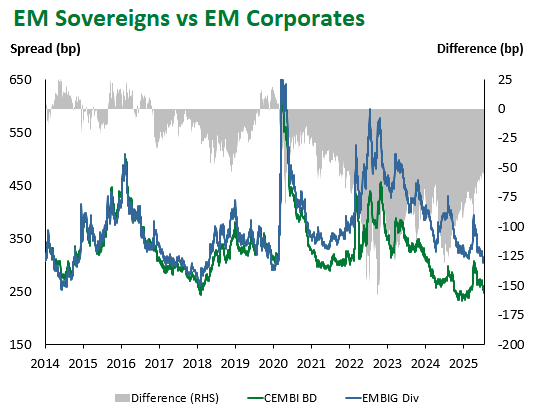
Emerging Markets Flows
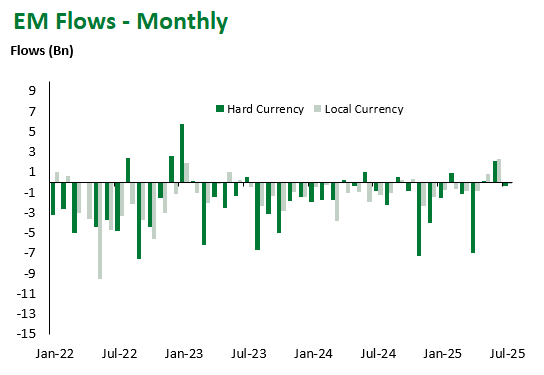

Source for graphs: Bloomberg, JPMorgan, Gramercy. As of July 18, 2025.
For questions, please contact:
Kathryn Exum, CFA ESG, Director, Co-Head of Sovereign Research, [email protected]
Petar Atanasov, Director, Co-Head of Sovereign Research, [email protected]
This document is for informational purposes only. The information presented is not intended to be relied upon as a forecast, research or investment advice, and is not a recommendation, offer or solicitation to buy or sell any securities or to adopt any investment strategy. Gramercy may have current investment positions in the securities or sovereigns mentioned above. The information and opinions contained in this paper are as of the date of initial publication, derived from proprietary and nonproprietary sources deemed by Gramercy to be reliable, are not necessarily all-inclusive and are not guaranteed as to accuracy. This paper may contain “forward-looking” information that is not purely historical in nature. Such information may include, among other things, projections and forecasts. There is no guarantee that any forecasts made will come to pass. Reliance upon information in this paper is at the sole discretion of the reader. You should not rely on this presentation as the basis upon which to make an investment decision. Investment involves risk. There can be no assurance that investment objectives will be achieved. Investors must be prepared to bear the risk of a total loss of their investment. These risks are often heightened for investments in emerging/developing markets or smaller capital markets. International investing involves risks, including risks related to foreign currency, limited liquidity, less government regulation, and the possibility of substantial volatility due to adverse political, economic or other developments. References to any indices are for informational and general comparative purposes only. The performance data of various indices mentioned in this update are updated and released on a periodic basis before finalization. The performance data of various indices presented herein was current as of the date of the presentation. Please refer to data returns of the separate indices if you desire additional or updated information. Indices are unmanaged, and their performance results do not reflect the impact of fees, expenses, or taxes that may be incurred through an investment with Gramercy. Returns for indices assume dividend reinvestment. An investment cannot be made directly in an index. Accordingly, comparing results shown to those of such indices may be of limited use. The information provided herein is neither tax nor legal advice. Investors should speak to their tax professional for specific information regarding their tax situation.
